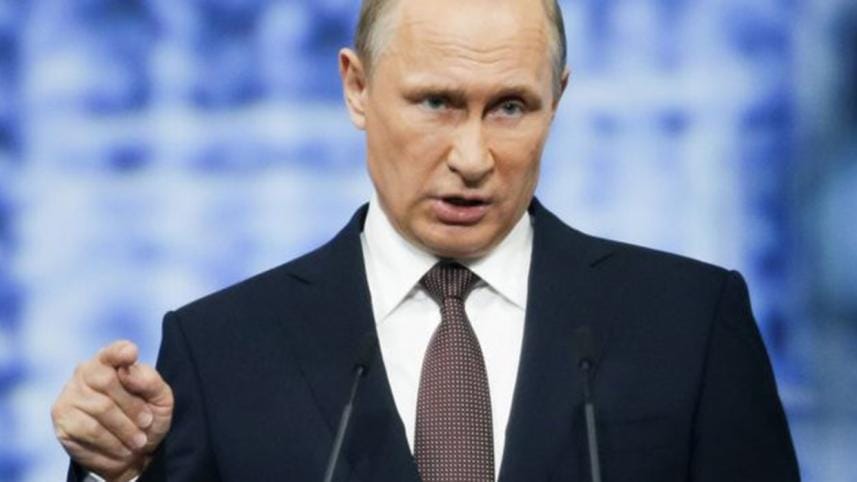Russia doping ban ‘unfair’, says Putin

Vladimir Putin has said it is unjust and unfair that Russian athletes remain banned from international competition, including the 2016 Olympics in Rio.
The International Association of Athletics Federation (IAAF) decided not to lift the suspension, imposed after accusations of state-sponsored doping.
Individual athletes can compete as neutrals if they prove they are clean.
The Russian president called on other bodies, including the International Olympic Committee (IOC), to intervene.
The IOC executive board said it would hold a telephone conference on Saturday to discuss the issue ahead of a full IOC summit in Lausanne on Tuesday.
"There are universally recognised principles of law and one of them is that the responsibility should be always personified," said President Putin.
"The people who have nothing to do with violations, why should they suffer for those who committed the violations?
"I'm assuming that we'll have a discussion with our colleagues in the World Anti-Doping structure and I hope for a suitable reaction from the International Olympic Committee."
The country was suspended by the IAAF in November 2015, after an independent World Anti-Doping Association (Wada) report depicted a culture of widespread doping, with even the secret services involved.
After that, Russia introduced reforms including an overhaul of the rules, the introduction of independent testing, and anti-doping lessons in schools.
A task force has been studying those reforms but a fresh Wada report, issued on Wednesday, made more damaging claims.
Although significant progress has been made to meet the IAAF's criteria, it said, work still remains. In particular:
- The deep-seated culture of tolerance for doping appears not to have changed. The head coach of the athletics team and athlete appear unwilling to acknowledge the extent of the doping problem.
- A strong and effective anti-doping infrastructure capable of detecting and deterring doping has still not been created.
- There are detailed allegations that the Ministry of Sport has orchestrated systematic doping and cover-ups.
Wada said officials in Russia were being stopped from testing athletes and threatened by security services.
Rune Andersen of the IAAF said Russian athletics had been "tainted by doping from the top level down."
"The systematic doping that has been ongoing in Russia - it's difficult to pick the clean athletes," he said.
IOC vice-president John Coates said Russia's athletes should remain banned and not be allowed to take part in the Rio Games this summer.
He also said Russia's anti-doping agency and athletics body were "rotten to the core".
Meanwhile, Russian pole vaulter Yelena Isinbayeva said she would challenge the IAAF's decision in court, claiming it was "a human rights violation".
Isinbayeva, 34, who won Olympic gold in 2004 and 2008, added: "I'm disappointed and angry. I am offended.
"Nobody fought for our rights and there are huge concerns over the IAAF itself and its stance on defending the rights of clean athletes.
"We are blamed for something we have not done. I will not remain silent, I will take measures. I will appeal to the human rights court."
In a statement, Russia's Ministry of Sport said it was "extremely disappointed" by the IAAF decision, adding that it believed "clean athletes' dreams are being destroyed because of the reprehensible behaviour of other athletes and officials".
IAAF president Lord Coe said "no politics" were involved in the decision over Russia's ban. He emphasised the unanimous nature of the verdict and the international range of council members.
 For all latest news, follow The Daily Star's Google News channel.
For all latest news, follow The Daily Star's Google News channel.
Comments